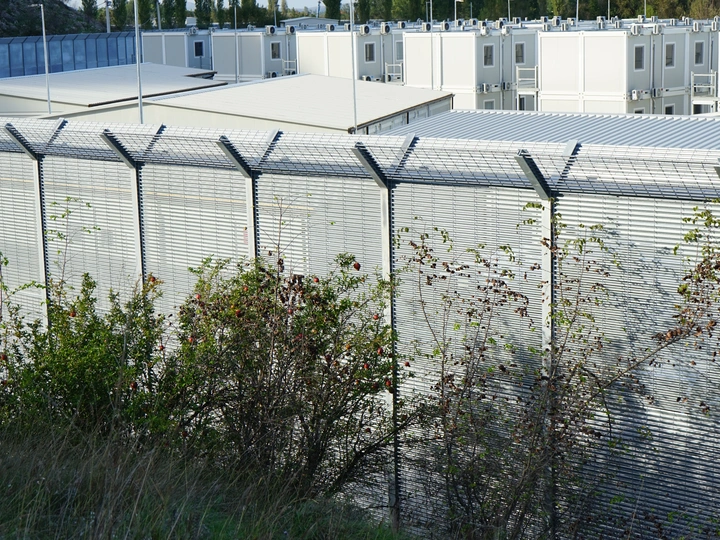ARCHITECTURES OF FICTIONALIZED HOSPITALITY

Kristina Millona
Kristina Millona is an investigative journalist and scholar based between Tirana and Vienna working on topics around migration, border violence and externalization of border control. She holds an MA in Transnational Queer Feminist Politics, from SOAS University of London and is a phd candidate at Central European University Vienna, working on the topic of Radicalization of Albanian male asylum seekers in the UK.
Europe Other is a grassroots collective in Albania advocating for migration justice
Klodiana Millona is a spatial and visual practitioner exploring invisible architectures, spatial justice and geographies of resistance
The project explores the role of architecture in the externalization of European Union borders and rethinks how it can shift from a tool for Containment to a design tool of Care and Hospitality. It examines migrant camps built offshore in Albania under the recent Italy-Albania migrant deal—marking the first instance in Europe where asylum processing is outsourced to a third country outside the EU. We focus on a highly invisibilized and peculiar border shift: the
de-territorialization of EU borders by relocating them to a non-EU country. Italy has constructed migrant centers on Albanian territory to transfer some of the migrants arriving by boat to undergo offshore asylum processing. However, these centers fall under Italian jurisdiction, legally designating them as Italian border areas even though the centers are located within Albanian soil.
The location of our project lies from the geographies of the center where borders are supposedly dismantled (EU) to the edges of European Union borders bathed by the Mediterranean (Italy) to the “periphery” of Europe (Albania) where EU borders are externalized.
Our research is conducted at two scales:
1- on the EU-Mediterranean scale – Making visible and analyzing the evolving border architectures of EU externalization practices.
2- on the Architectural Scale (1) from within (the facility) and (2) in the surrounding social context : Analyzing how the camp interacts with its environment and the effects of its highly visible, securitized architecture.
We engage with multiple research approaches: 1- site observations through ethnographic work; 2- Spatial Forensic Analysis : the carceral spatial configuration, the relationship with surrounding landscape, how does landscape serve bordering practices; 3- Research by Design: render visible the border architecture of EU externalization